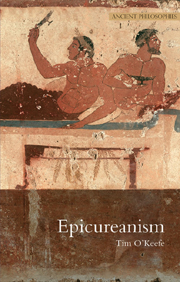Book contents
- Frontmatter
- Contents
- Preface
- Acknowledgements
- Sources and abbreviations
- Chronology
- 1 Introduction: the life of Epicurus and the history of Epicureanism
- I Metaphysics and physics: introduction and overview
- II Epistemology: introduction and overview
- III Ethics: introduction and overview
- 11 Pleasure, the highest good
- 12 Varieties of pleasure, varieties of desire
- 13 The virtues and philosophy
- 14 Justice
- 15 Friendship
- 16 The gods
- 17 Death
- Glossary of terms
- Notes
- Further reading
- Bibliography
- Index
12 - Varieties of pleasure, varieties of desire
from III - Ethics: introduction and overview
- Frontmatter
- Contents
- Preface
- Acknowledgements
- Sources and abbreviations
- Chronology
- 1 Introduction: the life of Epicurus and the history of Epicureanism
- I Metaphysics and physics: introduction and overview
- II Epistemology: introduction and overview
- III Ethics: introduction and overview
- 11 Pleasure, the highest good
- 12 Varieties of pleasure, varieties of desire
- 13 The virtues and philosophy
- 14 Justice
- 15 Friendship
- 16 The gods
- 17 Death
- Glossary of terms
- Notes
- Further reading
- Bibliography
- Index
Summary
Because the Epicureans proclaim that pleasure is the highest good, they have often been tarred with the same brush that tars all hedonists: that they are unscrupulous, unbridled sensualists, busy stuffing themselves with dainties from the local Epicurean shop before engaging in lascivious dances and disgusting orgies. The Epicureans rightly protest that this involves a gross misunderstanding of their philosophy. Instead, mental pleasures are greater than physical pleasures, and lack of pain is itself a kind of pleasure. Indeed, the highest sort of pleasure is tranquillity, freedom from fear and anxiety. So they recommend paring down one's desires to only the natural and necessary ones, which are easy to satisfy, and thereby gaining self-sufficiency and the confidence regarding the future that accompanies it.
Varieties of pleasure
The first distinction Epicurus makes is between mental and bodily pleasures and pains. In some sense, of course, all pleasures and pains are mental, in so far as one has to have a mind in order to experience them, and one experiences them primarily with one's mind (although the Epicureans insist that the body too has a share in sensation). Likewise, in some sense all pleasures and pains are bodily, in so far as animals and their minds are corporeal, and pleasures and pains are (in this sense) corporeal states. Still, there are some pleasures and pains that are bodily in a commonsensical way.
- Type
- Chapter
- Information
- Epicureanism , pp. 117 - 128Publisher: Acumen PublishingPrint publication year: 2009



